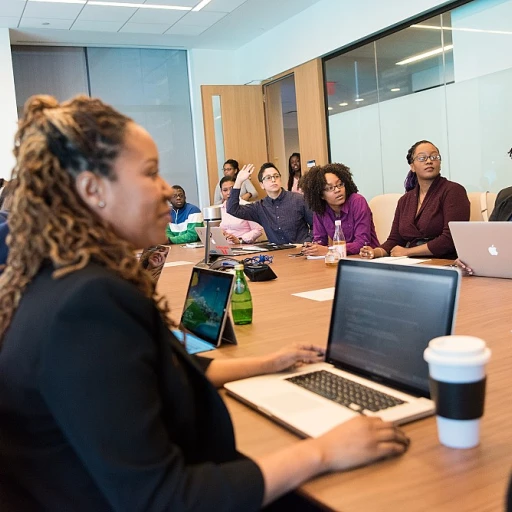
The Role of a Chief Human Resources Officer in Change Management
Understanding the Role and Responsibilities
The role of a Chief Human Resources Officer (CHRO) in change management is pivotal for the success of any organizational transformation. As senior executives, CHROs are tasked with overseeing the human resources aspects of change initiatives. Their work involves strategic planning and the consolidation of various business functions to ensure that the workforce adapts seamlessly to new processes and technology.
CHROs are responsible for developing and implementing change management strategies that align with the organization's long-term goals. They collaborate with project managers and management specialists to streamline change management activities, ensuring they are not only effective but also efficient. This often includes addressing the human side of change, which is crucial for the success of new projects and programs.
Critical Tasks and Involvements
- Leading organizational change efforts and formulating comprehensive strategies.
- Working with management consultants and project teams to integrate new systems and practices.
- Supporting remote work transitions and addressing the challenges that come with remote jobs.
- Overseeing the full implementation of change processes and ensuring they are aligned with the business objectives.
CHROs often gather insights from management ocm to ensure successful transitions, which can include analyzing data and trends from the supply chain to adapt strategies accordingly. They are key figures in maintaining the balance between people, processes, and technology, a critical factor in organizational change management (learn more about balancing people, processes, and technology in HR leadership).
Organizational Influence
Through their role, CHROs have a direct impact on business operations, influencing everything from human resources policies to career development paths. They are instrumental in fostering a change-ready culture that can adapt to the rapidly evolving business landscape.
Ultimately, the CHRO’s ability to effectively guide their teams through change is paramount. By leveraging their expertise, they not only contribute to the organization’s current success but also to its future resilience and adaptability.
Essential Skills for Success in Change Management Jobs
Key Attributes for a Thriving Change Management Career
In the dynamic landscape of change management, achieving success demands a particular set of skills and attributes. Aspiring Chief Human Resources Officers (CHROs) must hone these competencies to navigate the challenges of leading organizational change effectively. Here are some critical skills to focus on as you explore this career path.
- Strategic Vision: As change is an organizational constant, a CHRO must possess a strategic vision. This skill helps them align change initiatives with the company's long-term goals. By anticipating, planning, and guiding transformations, they can ensure successful outcomes.
- Communication: Effective communication is key in change management. CHROs must clearly articulate the reasons for change, the benefits, and the new direction. Whether it’s during early stages or weeks down the line, clear communication helps in reducing resistance and fostering buy-in.
- Adaptability: Senior leaders in change management must be adaptable to shifting circumstances. The business environment evolves rapidly, and flexibility ensures the CHRO can pivot strategies as necessary.
- Leadership: Leading a team through change requires strong leadership abilities. CHROs need to inspire and motivate employees, creating an environment where change is seen as a positive force. A management specialist will understand team dynamics and capitalize on them to drive successful transitions.
- Problem-solving: Addressing unforeseen challenges requires robust problem-solving skills. This aptitude allows CHROs to mitigate disruptions and keep the change projects on track, ensuring the organization recovers swiftly from any setbacks.
- Collaboration: Working closely with other departments, like supply chain or IT, is essential. Effective collaboration ensures different aspects of the organizational change are aligned and synchronized.
- Analytical Thinking: Analyzing data to assess the impact of changes is vital. CHROs need to gauge how changes influence key performance indicators and make data-driven decisions to refine the change strategy.
For more insights into facilitating organizational transformation, CHROs can explore a wealth of resources that cover strategic approaches to successful change initiatives. Visit how to facilitate organizational transformation for further guidance.
Challenges Faced by CHROs in Change Management
Challenges Confronted by CHROs in Navigating Change
In the continuously evolving landscape of organizational change, Chief Human Resources Officers (CHROs) encounter several formidable challenges in their roles. Among these challenges, managing both remote and on-site teams effectively is a pressing concern. As remote work becomes increasingly common, CHROs must adapt their strategies to ensure successful integration and communication across diverse teams located in various geographical areas. Moreover, CHROs often face the intricate task of aligning the organizational change with the company's overall business objectives. This requires a deep understanding of the global supply chain, alongside balancing senior and junior team dynamics. Successfully orchestrating change management involves playing multiple roles, from a project manager to a consultant, ensuring that every aspect of the change program is accounted for. The rapidly changing technological landscape also places additional demands on CHROs. Staying ahead in management ocm means constantly learning and adapting to new systems, tools, and methodologies. Integrating advanced software solutions while maintaining a human touch in human resources adds a layer of complexity to their roles. Furthermore, CHROs must navigate the challenges of cultural and behavioral transformation within an organization. Shifting established mindsets and routines can be slow and met with resistance. This is particularly true when changes are viewed as disruptive to people’s accustomed workflows. Developing strategies to manage resistance and fostering an environment where change is viewed as a positive evolution is vital. Lastly, CHROs are instrumental in maintaining stability and continuity throughout the change process. The early days of implementing change require meticulous planning and attention to detail to prevent potential setbacks. Drawing from past experiences, such as those from successful change initiatives weeks ago, they must ensure their team remains motivated and focused during the transitional period. These challenges underscore the need for a strategic approach in effective approaches to growth strategy in HR leadership, allowing CHROs to pave the way for successful and sustainable organizational transformation.Building a Career Path in Change Management
Charting Your Path in the Domain of Change Management
Exploring a career in change management, particularly as a Chief Human Resources Officer (CHRO), opens a variety of doors in the modern organizational landscape. As you venture into this field, it is vital to recognize the career trajectory and opportunities available.Setting foot in change management often begins in related roles, such as a project manager or human resources generalist. These positions provide foundational skills that are crucial when tackling organizational change. Early experience in management jobs, particularly those that focus on team dynamics and process improvement, is invaluable and can ease the transition into more senior roles where change management is central.
Skills honed during earlier roles, such as analytical thinking, interpersonal communication, and strategic planning, become instrumental as you advance. Growth often entails moving from a full-time position to more specialized roles, like a management specialist or OCM lead. Each step offers a chance to learn the intricacies of change, prepare for unpredictability, and implement strategies that ensure successful outcomes.
As you advance in your career, understanding various change methodologies and tools is beneficial. Continuous learning is essential; management ocm is an evolving field with new trends continuously emerging. From mastering remote work adaptations to embracing technological innovations, staying updated enhances your ability to implement effective change programs.
Moreover, networking and professional development play significant roles in advancing a change management career. Engaging with management consultants, attending seminars, and participating in professional organizations help in staying abreast of industry trends. These interactions can also provide mentorship opportunities and open doors to roles such as vice president or other senior leadership positions.
Future change management leaders are those who balance technical know-how and people dynamics effectively. By continually working on these skills and gaining varied management experiences, you set the stage for a flourishing career in change management, ensuring you are well-equipped to lead transformation in any business environment.
The Impact of Technology on Change Management
The Technological Shift and CHROs in Change Management
In the context of a rapidly evolving business landscape, the role of technology in change management has become significantly pronounced. Digital transformation is reshaping organizational environments, pushing Chief Human Resources Officers (CHROs) to integrate advanced technological tools into their change management strategies effectively. This shift necessitates the consideration of numerous impacts on both operations and employee experiences. As businesses in the United States and around the world continue to adapt to new technological advancements, CHROs are tasked with ensuring successful project implementations. Whether employing a software engineer or a management specialist, senior leaders need to possess not only technical proficiency but also a robust understanding of change management principles. Implementations like supply chain optimizations or the deployment of remote work options demand close collaboration with cross-functional teams to drive initiatives forward.Embracing Remote Work and Digital Platforms
The surge in remote jobs has introduced new dynamics to change management careers. Increasingly, HR leaders need to understand how remote work impacts organizational change. They must craft change management programs that overcome challenges specific to distributed teams. Modern technology provides tools for facilitating effective remote collaboration. Platforms that were barely considered a few years ago are now crucial for managing full-time remote jobs, permitting seamless communication, and maintaining employee engagement. HR leaders need to adapt their strategies to capitalize on these tools' potential, ensuring that remote teams remain aligned with organizational goals.Learning from Digitally-Enhanced Change Management Initiatives
Examples of successful change management initiatives frequently highlight how technology served as the backbone for transformation. Case studies from different domains underscore the relevance of digital tools in managing change. Programs guided by project managers, particularly in sectors employing robust change frameworks, showcase the benefits of leveraging new technology. These learnings can be applied by HR professionals eager to learn and grow within the management ocm (Organizational Change Management) field. Individuals pursuing careers in this domain can explore creative ways to synthesize technology with change management strategies, ensuring both organizational success and personal growth. As organizations continue to evolve, CHROs, whether junior in their careers or at a senior vice president level, will find that incorporating technological advancements into their managerial roles is essential. The ability to lead with a blend of technical and .managerial proficiency will define the future landscape of change management jobs, paving the way for transformative success across industries.Case Studies: Successful Change Management Initiatives
Learning from Success: Real-World Change Management Examples
The role of a Chief Human Resources Officer (CHRO) in managing change is multidimensional, involving coordination across various organizational levels and functions. Successful initiatives provide valuable insights into navigating the challenges encountered by CHROs. Here, we explore some notable examples of successful change management initiatives that highlight the critical components of this dynamic career.- Remote Work Transition: A multinational corporation embarked on transforming its traditional work environment into a fully remote work model. The project manager, working alongside the CHRO, developed a comprehensive program to facilitate organizational change. By prioritizing employee engagement and clear communication, the initiative ensured a smooth transition for both the workforce and management teams.
- Digital Transformation in the Supply Chain: In response to the rapidly changing digital landscape, a senior management team initiated an organizational change focusing on integrating technology into its supply chain operations. This initiative demanded strong leadership from the CHRO to drive cultural alignment and training programs. Ultimately, the successful implementation improved efficiency and created long-term value for the business.
- Cultural Realignment in a Remote Organization: Weeks ago, a leading company in the United States needed to realign its organizational culture to accommodate full time remote jobs. A management specialist led the charge, employing strategic human resources practices to reshape employee engagement and redefine company values. This transition resulted in increased job satisfaction and continuous learning opportunities for the team.













